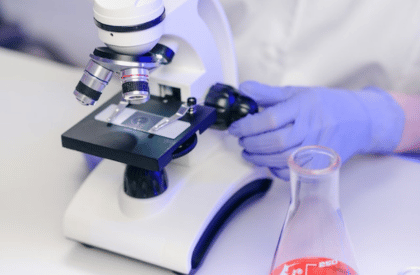How is Artificial Intelligence used in Healthcare?

Artificial Intelligence used in Healthcare
Introduction
Artificial intelligence in Healthcare (AI) is proven to revolutionize patient care, diagnostics, and research, and transform the healthcare industry. From improving diagnostic accuracy to enhancing personalized treatment plans, AI is changing the way healthcare is delivered. This article examines the diverse applications of AI in healthcare and highlights the impact of AI on various aspects of the industry.
1.AI-powered diagnostic tool
Artificial intelligence in Healthcare is powered by diagnostic tools which are revolutionizing the accuracy and efficiency of medical diagnosis, helping healthcare professionals make informed decisions.
- Machine learning algorithms analyze medical images such as X-rays, CT scans, and MRIs to help detect diseases and abnormalities.
- AI algorithms can highlight potential problem areas, assist radiologists in their assessment, and improve accuracy.
- AI-powered diagnostic tools can quickly analyze large amounts of patient data, including medical histories and test results, to enable timely and accurate diagnoses.
- These tools enable providers to identify patterns, trends, and potential correlations in patient data to support early detection and intervention.
- Integrating AI into diagnosis improves the speed, accuracy, and overall quality of medical diagnoses, leading to better patient outcomes.


2.Individual treatment plan
Artificial intelligence in Healthcare enables personalized treatment plans for individual patients, optimizing outcomes.
- AI algorithms analyze patient data, including genetic information and medical history, to recommend optimal treatment options.
- Machine learning models predict the efficacy of specific treatments based on similar cases and outcomes
- AI-powered decision support systems help healthcare providers determine the most effective treatment protocols.
3.Medical Research and Drug Development
Artificial intelligence in Healthcare accelerates the medical research and drug development process, opening up new avenues for innovation.
- AI algorithms analyze large volumes of medical literature and research data to identify possible connections and patterns.
- Machine learning models can help predict the success rate of new drugs and their potential side effects.
- AI-powered virtual drug screening can help identify promising compounds and accelerate the drug development process.

Artificial intelligence in healthcare

4.Remote Patient Monitoring
Artificial intelligence in Healthcare are enabled remote patient monitoring which has revolutionized healthcare by enabling continuous and proactive patient management outside the traditional healthcare environment.
- Wearable devices powered by AI algorithms monitor vital signs such as heart rate, blood pressure, and blood sugar levels, allowing healthcare professionals to remotely monitor patient health.
- AI-powered chatbots and virtual assistants provide real-time communication and support, enabling patients to report symptoms and receive timely assistance.
- Machine learning algorithms analyze data from remote monitoring devices and help identify anomalies and trends that may indicate potential health risks.
- Remote patient monitoring improves patient engagement, increases convenience, and enables early intervention, leading to more effective health care and better patient outcomes.
5.Precision Medicine
Artificial intelligence in Healthcare will play a key role in driving precision medicine and tailoring treatments to individual patients.
- AI algorithms analyze large datasets containing genomic information to identify biomarkers and personalize treatment plans.
- Machine learning models can help predict the likelihood of treatment success and potential side effects.
- AI-powered tools help match patients to clinical trials based on their unique characteristics.


6.Medical Image Analysis
Artificial intelligence in Healthcare is powered with medical image analysis has revolutionized medicine by improving the accuracy and efficiency of disease diagnosis and monitoring.
Various medical images such as X-rays, CT scans and MRIs are analyzed with deep learning algorithms to help detect abnormalities and diseases.
- AI models can quantify tumor characteristics, aid treatment planning, and monitor disease progression.
- Computer-assisted detection systems based on AI algorithms help radiologists identify potential problem areas, thereby improving diagnostic accuracy.
- AI-powered image analysis tools aid case prioritization and triage, optimizing radiology workflow efficiency.
- AI-powered medical image analysis provides medical professionals with valuable insights that lead to early detection, accurate diagnosis, and improved patient outcomes.
7.Patient Risk Stratification
Artificial intelligence in Healthcare facilitates patient risk stratification and identifies individuals at increased risk of developing certain diseases.
- Machine learning models analyze patient data, including medical history and lifestyle factors, to predict disease likelihood.
- AI algorithms help healthcare providers intervene early and take preventive action.
- Risk stratification models help identify patients who may benefit from targeted screening or intervention.

Artificial intelligence in healthcare

8.Virtual assistants and chatbots
Artificial intelligence in healthcare, including virtual assistants and chatbots, has transformed the industry by enhancing patient engagement and providing convenient access to information and support.
- AI-powered virtual assistants interact with patients to help schedule appointments, access medical records, and manage medications.
- Chatbots provide instant support, answer common medical questions, and provide guidance on symptoms, treatments, and medical resources.
- These artificial intelligence-powered solutions boost patient happiness by delivering personalised and quick support, decreasing the need for phone calls and long wait periods.
- These AI-driven tools improve patient satisfaction by providing personalized and timely support and reducing the need for phone calls and long wait times.
- Virtual assistants and chatbots make healthcare more efficient, freeing up healthcare professionals’ time and resources for more important tasks.
9.Predictive analysis of disease outbreaks
Artificial intelligence in Healthcare will enable predictive analytics to better predict and manage disease outbreaks.
- AI algorithms analyze vast amounts of data, such as social media posts and health records, to detect early signs of disease outbreaks.
- Machine learning models can help predict the spread of infectious diseases and allocate resources accordingly.
- AI-powered surveillance systems will enable public health officials to respond quickly to potential epidemics.


10.Optimizing Medical Workflows
Artificial intelligence in Healthcare plays a key role in optimizing healthcare workflows, streamlining processes, and improving overall healthcare efficiency.
- AI algorithms automate administrative tasks such as scheduling, medical coding, and billing, reducing the burden on healthcare workers.
- Machine learning models help optimize resource allocation, staffing schedules, and bed management based on patient demand.
- AI-powered predictive analytics can help predict patient influx and ensure sufficient resources to meet healthcare needs.
- Intelligent algorithms make it easy to prioritize patient cases, allowing urgent cases to be addressed quickly.
- By streamlining healthcare workflows with AI, healthcare providers can deliver timely and efficient care, and improve patient satisfaction and outcomes, while reducing administrative burden.
Conclusion
Artificial intelligence in Healthcare has the potential to transform healthcare by improving diagnosis, treatment planning, and patient care. From improving accuracy and speed to personalizing care, AI is giving healthcare providers advanced tools and insights. By harnessing the power of AI, the healthcare industry can improve patient outcomes, streamline workflows, and pave the way for a more efficient, patient-centric future.












